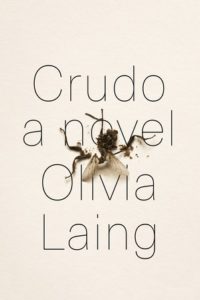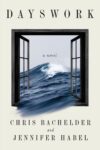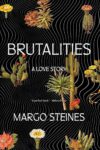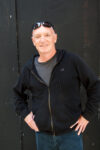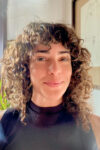Last August, Chris Kraus published a biography, many years in the making, of writer Kathy Acker. Olivia Laing, a British writer then known primarily for her non-fiction work, read it, then wrote a book, really fast, over seven weeks. “In real time,” the press materials inform me. And so, here we are: Crudo, Laing’s first novel. It isn’t slow, or overly deliberate, and it doesn’t always feel planned out – but then, neither does the time in which we’re living. Isn’t that what everyone says? It feels experimental. What would happen if you wrote a summer (August 2017) as it happened, marking the dates as they passed, responding to world events at the same time as the rest of the world? I.e., what if you were to take Twitter, and somehow make that into a novel?
Even really fast book publishing, of course, can’t quite keep up with the Internet. It’s been a year since Laing wrote the novel, and many of the events that seemed so pressing last August have faded. OK, the neo-Nazis are doing different things this year. There are new hurricanes, new floods, different people getting hired and fired by the President. Do I sound flippant? Is this too casual? Welcome to Crudo. The word, it should be mentioned, refers to raw seafood, cooked in the Italian style. Laing’s protagonist, Kathy, is getting married. She’s obsessed with Twitter. She’s clued into world catastrophes in a way that feels morally necessary, but also obsessive and in stark contrast to the rest of her life.
Crudo (somewhat coyly) both is and isn’t about Kathy Acker, who died of cancer in 1997. Kathy, the character, shares some family history and personal opinions with Acker, the writer, and she’s written everything Kathy Acker wrote. But she’s alive, unlike Acker, and able to reflect (in real time) on the events of August 2017; plus, she happens to share a lot of experiences and preoccupations with Laing herself, who was also married in 2017, also to a well-respected older poet, a man previously married to a now-deceased famous writer. (This is Ian Patterson, Cambridge professor, formerly married to Jenny Diski.) Kathy is American, but she sounds English, on the page and to her friends: “you’re all talking British,” one says, as he walks into a New York restaurant to meet Kathy and the others.
Hints of the real mad, bad Kathy Acker appear infrequently, mostly in references to things Kathy used to do: the “trick pad” she now rarely uses, the kinds of (lurid, violent) stories she used to write. There are scatterings of actual writing by Acker and Acker’s contemporaries in the text, sometimes supposedly being written as the events of the book happen: returning home from a London party, Kathy gets out her notebook and writes, “Its walls were painted with manure, I was the only human here.” The line is not formatted like a quotation, although a list of sources in the very back of the book reveals it as lifted from Dodie Bellamy’s 2004 book, Pink Steam. Laing’s use of writing by Bellamy and others is clearly an homage to Acker’s practice of “borrowing,” imitating, and parodying material from many different sources, and then incorporating it, seamlessly, into her own; but the source list at the back undercuts its bite. (Although one could also argue it corrects the potential ethical problems of misattribution inherent in the un-formatted use of others’ material, particularly that of other women writers and writers of color.)
The blending of Laing’s and Acker’s writing reflects the ways in which Kathy is both Laing and Acker, and neither; but it also, perhaps unintentionally, points to the exuberance of Acker’s writing, and, at times, the relative flatness of Laing’s. Oh, I thought, looking through the source list. That’s why that passage seemed so alive: the line about “mommy . . . I know she’s on Dex,” or the revelation that “I myself never commit murder, I’m constantly drunk, I never despair. I’m as normal as any moral person,” or the pseudo-Dickinsonian “Knowing is tenuous as a swamp.” All the best lines are Acker!
And also all the wildest. For all her internal self-castigation — “Were other people as bad as Kathy?” Kathy wonders, early in the book — Laing’s Kathy is not terribly strange, evil, or shocking. As Tessa Hadley points out, in a generally positive review, “Kathy actually seems perfectly nice, or at least as nice as most of us.” For all the bluster, she writes, this is “a sweeter, kinder book, perhaps, than it quite wants to be.” I think of one scene in which Kathy’s mild, loving husband lounges, in the nude, in the backyard of their shared house. Safely ensconced in the “hidden zone” Kathy has built for him there, he lies behind the shed, “lordly on a striped blue towel, preserving, he explains, his small speckled bottom from splinters and ants.” This image of Kathy’s love lying naked, in the protective space she has constructed specifically for his pleasure, is one of the most enduring of the book. It’s also a surprising evocation of a marriage in which many of the traditional ways that men are meant to show love for women and women for men get flipped, contorted, or made utterly irrelevant. It’s lovely. And it is hard, though surely not impossible, to imagine the real Acker in such a situation, or at least writing about it in such a way.
Indeed, I sometimes wondered why Laing had bothered to write this book as a fiction at all. Laing answered the question in – again – the press materials: “I wanted to be as free as possible,” she said, able to “record all the global and personal shifts of the summer, but from a consciousness that was like an exaggerated, cartoonish version of my own.” But this explanation is not fully satisfying. Why the use of Acker as her cartoon figure? I wondered if, as Kraus once said of her most well-known work, I Love Dick, the material in this case was “too personal to write in the first person.” (Crudo is written primarily in a close third-person.) In any case, Kraus herself shied away from the idea of achieving any kind of “true” portrait of Acker for the book that inspired Crudo, stating, in an interview, “There’s no ‘real’ Kathy.” The Acker of After Kathy Acker is (merely?) “a hologram, synthesized from the research.” This assertion allows Kraus, and Laing, some leeway, a certain blurred quality, perhaps. Fiction, here, allows Laing to inhabit a voice that isn’t quite her own, but can hardly be said to be someone else’s. Nice Kathy and her nice husband seem, at times, to have very little in common with the Acker who wrote, in Great Expectations (1982), “he NEEDED to maul shove into knead his mental and physical being like he did those tubes of paint. I not only understood, I understood and adored. . . I want your cock because you’re a great artist.” But this is not necessarily a bad thing.
In interviews, Laing has described Crudo as a sequel to The Lonely City, her 2016 book of essays. Lonely City used Laing’s experience of profound loneliness in New York City as a frame for a series of deeply thoughtful and empathetic biographical sketches of artists Edward Hopper, Andy Warhol, Henry Darger, and David Wojnarowicz, following, in this framework, Laing’s 2013 work, The Trip to Echo Spring. Biography seems to offer an emotional way in for Laing that pure autobiography can’t provide. Both books examined isolation, desperation, and fear, and considered the ways in which these conditions have and have not permitted artists — well, famous, white, male, American artists, at least — to create. While The Lonely City considered the dangers and occasional joys of loneliness and isolation, Laing has suggested, Crudo deals with the problems of intimacy and love. How will wild Kathy learn to live in English domesticity? And, if it wasn’t obvious by now, how will Laing? One of these interviews, to punctuate the point, takes place in the London apartment that Kathy considers buying, and Laing, evidently, actually did.
But I am now neglecting a central preoccupation of the book. Kathy is dealing – sometimes poorly, sometimes well – with the difficulties of closeness and intimacy; but she is also dealing with anxiety and hysteria in an age of mass information. Really, it’s the feelings that mass information generate, not the information itself. In fact the information itself may be beside the point. There’s an uncomfortable sameness to the way events get disseminated, and then received by Kathy in the book, a blending together of every kind of horrible thing. Laing tends to relay this information in long, bleak paragraphs:
The tide of cruelty in the world was drawing in, it was impossible to ignore. The waters were rising in Miami, Tampa, Naples. You could not possibly stay at home, but the police had announced that if you had an outstanding warrant, you would be arrested at the shelter. . . What’s Putin doing, what’s happening in China, in North Korea, in the US? . . . In the House of Commons, MPs barracked Caroline Lucas for asking apropos Irma when we were going to get to grips with climate change. They actually shouted Shame. This is how it is then, walking backwards into disaster, braying all the way.
Kathy herself feels the paralysis such information, communicated in such a way, brings on, describing herself as a “beached somnolent whale.” Most of all, though, but in a way really least of all, Kathy is having trouble dealing with the jarring contrast between the increasingly happy, affluent life we have already discussed, and the absolute chaos and annihilation happening in the ever-expanding realm of “somewhere else.” By which is meant the Internet. Kathy is obsessed, she’s becoming an expert on neo-Nazis, she’s deep in it. But Kathy is also ready for life, full of vitality. “Death is passé,” she thinks. She’d rather “reek of well-being.” She wants “three or four houses so that she could move between them,” and swims naked in the pool at the luxury hotel she and her husband have “accidentally” wound up in in Tuscany. (The book takes place in Italy, England, and New York, although it feels more like it’s been set inside Kathy’s own body.)
It is on these latter points that Crudo is most affecting, and also most frustrating. Laing is eloquent and incisive on the essential strangeness of contemporary middle/upper-middle/upper-class life in the Western world: that is, the experience of being on vacation in Italy or sitting in your sunny garden or lying in bed with your beloved husband, feeling utterly happy, even as your social media stream fills to flooding with genocide, chaos, and climate disaster. “The equations,” Laing writes, “were too difficult, you knew intellectually, but you never really saw the consequences, since they tended to impact other poorer people in other poorer places.” It’s arch and also relatable; it’s true but disturbing to say. Earlier, thinking over her life choices on a deck chair by the pool in a luxury hotel, Kathy notes, with characteristic anxiety, that “even lying here on her back she was probably despoiling something.” Her problems are low-stakes compared to flooding in Houston, the fire at Grenfell Tower. She knows this, and Laing knows this – Kathy, her cartoonish self, her exaggeration. Still we are witness to Kathy’s fight with her husband over poaching his prosciutto and fig ciabattas, his inability to follow Google Maps, the panicked feelings inside her: “she hated him, she hated any kind of warmth or dependency, she wanted to take up residence as an ice cube in a long glass of aqua frizzante.”
And can we fault her for worrying about intimacy while icebergs break off of ice shelves, trash heaps circulate the ocean, the Gulf of Mexico fills with dead fish – and that’s only one week? Kathy reflects frequently on the inability of other people to “put anything together.” At one point, she reads an article in which the author describes the reasons for monarch butterflies dying off, then takes a flight across America to make herself feel better by seeing the butterflies – failing to see a connection between animal extinction and casual airfare. She’s right. But all of Crudo is like that, and perhaps your life is like that, too. Full of disjunction. Knowing one thing and doing another. Absolutely global and absolutely provincial. That is, we live here, many of us, in this moment, in this world. “Other things were going on at the same time,” Laing writes, speaking of the News, Twitter, what Kathy refers to as “the world talking . . . [an] opinionated little voice in an indecently augmented chorus.” These things are Other to – what? A fox, in Kathy’s case, in the backyard; a dragonfly with a “totally new colour,” spotted by her husband. Ten years ago, she thinks,
it was possible to ignore atrocities, to believe that these things happened somewhere else, in a different order of reality from your own. Now, perhaps because of the internet, it was like the blind spot had got very small, and motionful like a marble. You couldn’t rely on it. You could go on holiday but you knew corpses washed up there, if not now then then, or later.
So much happens in that somewhere else. Frequently Laing does not even mention the events or places by name. Why bother? You’ve likely seen the photo of the Houston seniors in their flooded living room, though perhaps you haven’t thought of them lately, Hurricane Harvey having occurred by now in some distant news cycle, some other universe almost. You know, you know, you know. It is all so recent, so almost-up-to-date. Do we want that? Can we look away? Can we afford to? Is it enough simply to know? Is it enough to be wracked with anxiety, like Kathy? And if not, even if so, how do we then live our lives?
These questions feel like looking at something from very, very far away, through binoculars.
Jacqueline Krass is a PhD student at the University of Wisconsin-Madison. Her research has examined literary influence and female genealogies in the work of Chris Kraus and Fanny Howe, and her interview with Kraus appeared in Textual Practice (2018).
This post may contain affiliate links.



